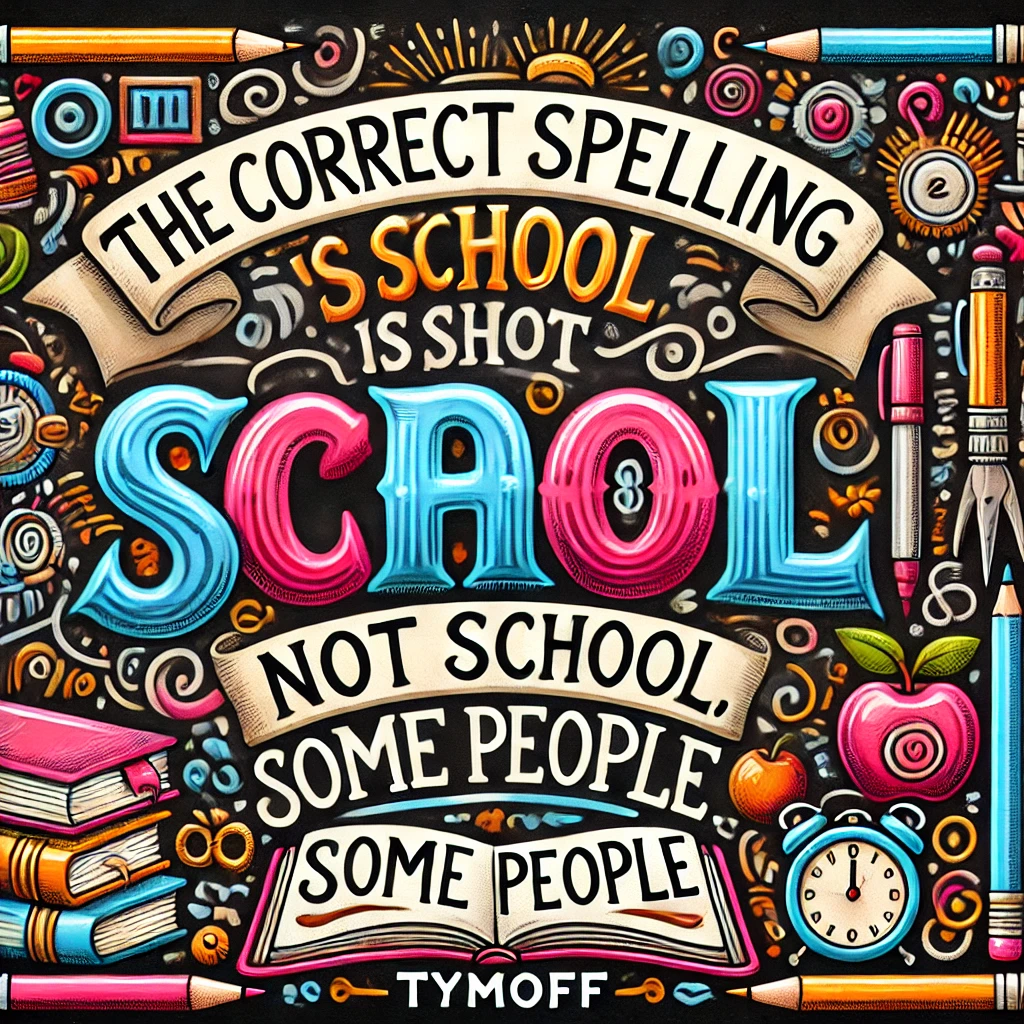In a world brimming with linguistic nuances and quirks, spelling errors often become a focal point for humor and learning. Among the myriad of common spelling mistakes, one that stands out and has caught the attention of many is the misspelling of the word “school” as “shcool.” While it might seem like an insignificant error, this simple mistake opens a gateway to broader discussions about the importance of spelling, the psychology of errors, and how digital tools are reshaping our understanding of language.
Understanding the Importance of Correct Spelling
Spelling is more than just a set of rules for arranging letters; it is a crucial element of effective communication. Correct spelling ensures clarity and helps avoid misunderstandings. For instance, consider how a minor misspelling, such as “shcool” instead of “school,” might affect the perception of the writer. A seemingly trivial mistake can cast doubts on the writer’s attention to detail, professionalism, or even their grasp of the language.
Moreover, spelling serves as a foundation for literacy. Proper spelling skills improve reading comprehension and writing proficiency, making it an essential aspect of education. It’s no wonder that spelling errors like “shcool” are often used as teaching moments to reinforce the importance of accuracy in language.
Why Do People Misspell Words Like “School”?
The misspelling “shcool” is a fascinating example of how errors occur in written language. Several factors contribute to such mistakes, ranging from cognitive processes to environmental influences:
- Cognitive Slip-Ups: Our brains process words holistically rather than letter by letter. When typing quickly or without focus, the mind might rearrange letters, especially when they are part of a familiar word. This phenomenon is known as a typographical error and is more common than one might think.
- Keyboard Layouts and Typos: The arrangement of letters on a keyboard can sometimes lead to accidental switches. For instance, the proximity of certain keys might cause someone to type “shcool” instead of “school.”
- Learning Challenges: Individuals with learning difficulties, such as dyslexia, may find spelling particularly challenging. Words like “school,” which have phonetic and non-phonetic elements, can be confusing for those grappling with such conditions.
- Autocorrect and Predictive Text: Ironically, the very tools designed to help us avoid spelling errors can sometimes be the culprits. Autocorrect features may not always catch mistakes like “shcool,” especially if the user types quickly or overrides the suggested correction.
The Role of Technology in Spelling Accuracy
In today’s digital age, technology plays a significant role in shaping our approach to spelling. Tools like spell checkers, autocorrect, and grammar applications have become indispensable in ensuring written accuracy. However, they also raise important questions about over-reliance and the erosion of basic spelling skills.
For example, a person who frequently relies on spell-checking tools might become complacent, paying less attention to their spelling. This dependence can perpetuate errors such as “shcool” slipping through, particularly when the tools fail to flag the mistake. On the flip side, these technologies can serve as valuable aids, especially for non-native speakers or individuals with learning difficulties, by reinforcing correct spelling through consistent feedback.
Educational Strategies to Address Common Spelling Errors
Addressing frequent misspellings like “shcool” requires a multifaceted approach, especially in educational settings. Teachers, parents, and students can adopt various strategies to enhance spelling proficiency:
- Phonetic Learning: Encouraging students to break down words into phonetic components can help them understand the relationship between sounds and letters. For instance, emphasizing the “sch” sound in “school” can aid in correct spelling.
- Repetition and Practice: Regular practice of challenging words through writing exercises, spelling bees, and flashcards can significantly improve retention.
- Visual Aids: Visual learning tools, such as word charts or digital apps with engaging graphics, can make spelling practice more enjoyable and effective.
- Encouraging Reading: Exposure to well-written material is one of the best ways to internalize correct spelling. Reading books, articles, and other written content reinforces the proper arrangement of letters in commonly used words.
- Gamification of Learning: Turning spelling into a game through apps or classroom activities can motivate students to pay closer attention to detail.
The Broader Implications of Spelling Errors
While a misspelling like “shcool” might seem trivial, it underscores broader implications for how language reflects personal and professional identity. In professional settings, spelling errors can tarnish credibility and professionalism. For example, a resume or business email containing spelling mistakes can leave a negative impression, potentially costing opportunities.
On a societal level, consistent spelling errors highlight disparities in education and access to learning resources. Addressing these issues requires collective efforts to make education more inclusive and accessible, ensuring that everyone has the tools to master basic language skills.
How Social Media Amplifies Spelling Errors
In the era of social media, spelling errors like “shcool” often gain attention, sometimes going viral for their humor or relatability. Platforms like Twitter, Instagram, and TikTok have become spaces where language trends—both correct and incorrect—spread rapidly. While this can normalize certain errors, it also provides opportunities for public discourse on language and literacy.
Hashtags like #SpellingFails or #GrammarHumor turn mistakes into teachable moments, blending entertainment with education. Additionally, influencers and educators on social media often use such instances to create content that raises awareness about the importance of proper spelling.
The Psychological Perspective: Why Mistakes Persist
From a psychological standpoint, the persistence of errors like “shcool” can be linked to habit formation and cognitive patterns. Once a person repeatedly makes a specific mistake, it becomes ingrained in their writing habits. Overcoming such habits requires conscious effort, including slowing down while writing and actively reviewing one’s work.
Mistakes also persist due to the “illusion of correctness,” where individuals assume their writing is accurate without thorough proofreading. This is particularly common when the focus is on conveying ideas quickly rather than on meticulous accuracy.
Conclusion: Striving for Perfection in Language
The correct spelling is “school,” not “shcool,” and while this may seem like a minor detail, it reflects larger themes about language, communication, and education. Spelling errors are natural and often unavoidable, but they offer valuable opportunities for learning and self-improvement.
By understanding the reasons behind common mistakes and leveraging educational strategies, we can minimize errors and enhance our linguistic abilities. Whether through traditional methods like reading and practice or modern tools like spelling apps and social media discussions, the journey to mastering spelling is both essential and achievable. After all, language is not just a means of communication; it is a reflection of who we are and how we connect with the world.



